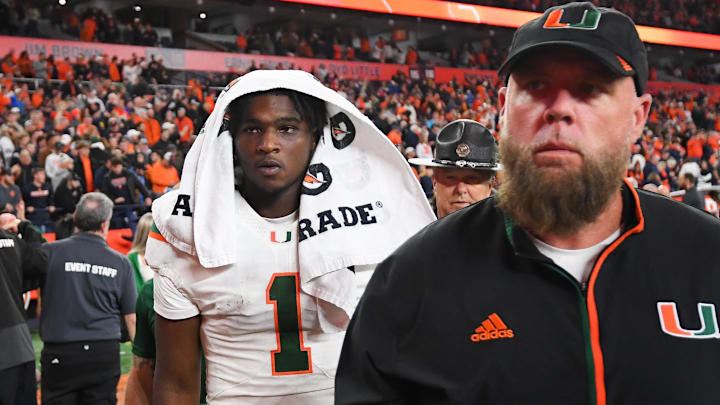Do we really have to pretend that Miami belongs in the College Football Playoff over Alabama?
If you haven’t been on the College Football side of X (Formerly Twitter) in the past couple of days, let me fill you in. “wHeRe iS mIaMi???” The 10-2 Hurricanes fell from No. 6 to No. 12 in the latest College Football Playoff rankings, placing them behind Alabama for what many assume will be the final playoff spot.
But despite a better record, it’s hard to imagine the Canes getting the nod above Alabama, considering the Committee’s selection process. The process that goes through: conference championships won, strength of schedule, head-to-head, and common opponents.
Putting conference championships aside, your first criterion to distinguish Miami and Alabama is the strength of schedule. Miami, 10-2, 6-2 ACC has a superior record to Alabama, 9-3, 5-3 SEC, but their strength of schedule just isn’t there.
According to ESPN, Miami’s strength of schedule is No. 55, and their strength of record with that is No. 14. Alabama, meanwhile, comes in at No. 17 for SOS and a SOR that puts them at No. 10.
Breaking it down game by game, Miami’s record objectively looks weaker than Alabama's. This season, Miami only played two teams inside the top 30 on ESPN’s Football Power Index, going 2-0, while Alabama played seven, going 5-2.
When you compare the losses, Alabama arguably still comes out better. Miami’s two losses came to Georgia Tech and Syracuse, who posted a combined 16-8 record record while ranking No. 38 and No. 53 in the power index. For Alabama, the three losses have a joint record of 22-14. The lowest-ranked team, Alabama, took a loss to Vanderbilt ranks No. 39 in the FPI.
While both programs have their ugly losses, it’s easier to forgive Alabama’s loss to Tennessee with the Vols being a playoff team. The other two losses are a little different. Syracuse and Georgia Tech have better records than Oklahoma and Vanderbilt, but the SOS and FPI have the Sooners and Commadores as better teams.
When comparing wins’ Miami lacks a true marquee victory. Their best win of the year was a shootout with an unranked Louisville team that ended in a 52-45 road win. Alabama went 3-1 against ranked opponents. Louisville does rank No.13 in the FPI, but Alabama’s wins over Georgia (No. 5), South Carolina (No. 14), and LSU (No. 17) make for better-quality victories.
The next category of determination will be head-to-head. Alabama and Miami didn’t play, so this isn’t a big factor outside of the who-would-win question. Judging by the Jekyll and Hyde nature of Alabama, it could be hard to predict. But the advantage based on the strength of the schedule and the number of big games played already would be given to Alabama.
Common opponents are the final factor, and there is one South Florida. Alabama drew the Bulls in week two and, after a slow start, pulled away 42-16. Miami put on an offensive clinic against South Florida, with Cam Ward throwing for 404 yards and three touchdowns en route to a 50-15 win.
This is the one area where I think Miami has a point. The Hurricanes do have a better win over South Florida, but does that put you over the top, considering the difference in the record between the two teams?
To be entirely fair, I think had Miami played the same schedule as Alabama, they likely finished 9-3 as well, and I understand that Miami doesn’t choose their schedule. But it’s equally unfair to penalize Alabama because Miami hypothetically could do just as well.
The problem with the SEC bias argument is the SEC is statistically a better conference than the ACC. When it comes down to these arbitrary decisions to the committee, the statistics of how you did it and who you did it to matter. Alabama played more teams in the top 25 of the PFI (5) than Miami did in the top 50 (4).
Louisville is a good win, but Georgia is better, Florida is a good win, but Missouri, South Carolina, and LSU are better. At the end of the day, Alabama just has a better resume.
